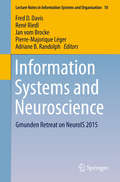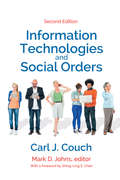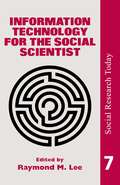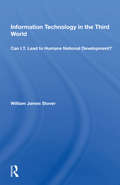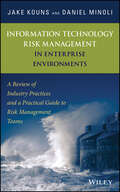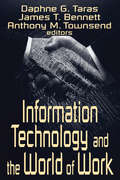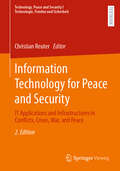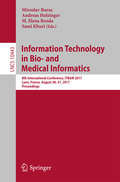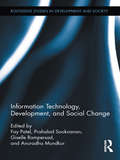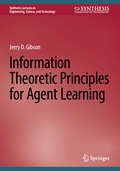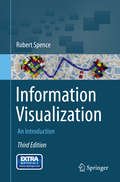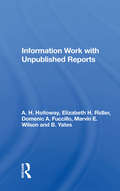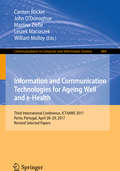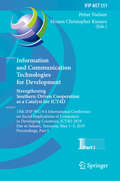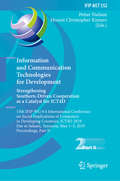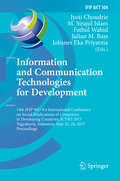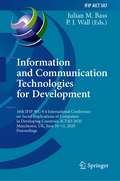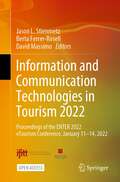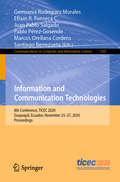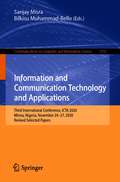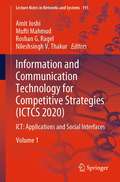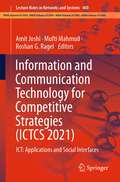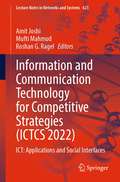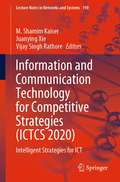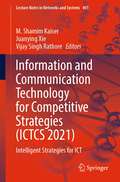- Table View
- List View
Information Systems and Neuroscience
by Jan Vom Brocke René Riedl Pierre-Majorique Léger Fred D. Davis Adriane B. RandolphThis book presents the proceedings of the Gmunden Retreat on NeuroIS 2015, reporting on topics at the intersection of Information Systems (IS) research, neurophysiology and the brain sciences. Readers will discover the latest findings from top scholars in the field of NeuroIS, which offer detailed insights on the neurobiology underlying IS behavior, essential methods and tools and their applications for IS, as well as the application of neuroscience and neurophysiological theories to advance IS theory.
Information Technologies and Social Orders (Communication And Social Order Ser.)
by Carl J. CouchAccording to Carl J. Couch, the history of human society is one of successive, sometimes overlapping, information technologies used to process the various symbolic representations that inform social contexts. Unlike earlier “media” theorists who ignored social context in order to concentrate on the information technologies themselves, Couch implements a consistent theory of interpersonal and intergroup relations to describe the essential interface between information technologies and the social contexts in which they are used. Couch emphasizes the formative capacities of information technologies across historical epochs and cultures, and places them within the major institutional relations of various societies. He views social orders as reflexively shaped by the information technologies that participants use, and as susceptible to mass brutality and oppression due to oligarchic control though he hopes technology will remain humane. The original edition of this manuscript was nearly complete at the time of Couch’s death and was brought to completion by two of his closest associates. Now after two decades, during which its impact is indisputable, it has been updated for a new generation of students and scholars. Additions include discussions on books in the digital age, social media, mobile telephones, recordings, participatory culture, and more.
Information Technology For The Social Scientist
by Raymond M. LeeAccessible and practical overview to help social reseachers make the most of information technology in relation to research design and selection, management and analysis of research data. The book pinpoints current and future trends in computer-assisted methods.; This book is intended for postgraduate and undergraduate social research methods courses and professional social researchers in sociology, social policy and administration, social psychology and geography. Particular appeal to courses in computer applications for social scientists and researchers.
Information Technology In The Third World: Can I.T. Lead To Humane National Development?
by William James StoverMass media, telecommunications, and computer technology can effect change in poor countries, but Third World leaders are often disappointed in the results. Professor Stover looks closely at information technology and communication as agents of economic, social, and political development in Third World countries, stressing that definitions of "communication" and "development" must include participation in the exchange of information and the attainment of humane values. He examines reasons why the current world information order does not meet the needs of the Third World and argues that the major difficulty in achieving the potential of information technology for humane development is a cyclical pattern involving technology and values. When countries acquire the physical means of communication, their leaders are tempted to control them, resulting in censorship that prevents genuine communication. Breaking this cycle is a major requirement in using information technology for development, and Dr. Stover discusses how this may be accomplished practically in developmental, Western, and Soviet contexts.
Information Technology Risk Management in Enterprise Environments
by Jake Kouns Daniel MinoliDiscusses all types of corporate risks and practical means of defending against them.Security is currently identified as a critical area of Information Technology management by a majority of government, commercial, and industrial organizations.Offers an effective risk management program, which is the most critical function of an information security program.
Information Technology and the World of Work
by James T. Bennett Anthony M. Townsend Daphne Gottlieb TarasInformation technologies have become both a means and an end, transforming the workplace and how work is performed. This ongoing evolution in the work process has received extensive coverage but relatively little attention has been given to how changing technologies and work practices affect the workers themselves. This volume specifi cally examines the institutional and social environment of the workplaces that information technologies have created.
Information Technology for Peace and Security: IT Applications and Infrastructures in Conflicts, Crises, War, and Peace (Technology, Peace and Security I Technologie, Frieden und Sicherheit)
by Christian ReuterTechnological and scientific progress, especially the rapid development in information technology (IT) and artificial intelligence (AI), plays a crucial role regarding questions of peace and security. This textbook, extended and updated in its second edition, addresses the significance, potential of IT, as well as the challenges it poses, with regard to peace and security. It introduces the reader to the concepts of peace, conflict, and security research, especially focusing on natural, technical and computer science perspectives. In the following sections, it sheds light on cyber conflicts, war and peace, cyber arms control, cyber attribution, infrastructures, artificial intelligence, as well ICT in peace and conflict.
Information Technology in Bio- and Medical Informatics: 8th International Conference, ITBAM 2017, Lyon, France, August 28–31, 2017, Proceedings (Lecture Notes in Computer Science #10443)
by Miroslav Bursa, Andreas Holzinger, M. Elena Renda and Sami KhuriThis book constitutes the refereed proceedings of the 8th International Conference on Information Technology in Bio- and Medical Informatics, ITBAM 2017, held in Lyon, France, in August 2017.The 3 revised full papers and 6 poster papers presented were carefully reviewed and selected from 15 submissions. The papers address a broad range of topics in applications of information technology to biomedical engineering and medical informatics.
Information Technology, Development, and Social Change (Routledge Studies in Development and Society)
by Fay Patel Prahalad Sooknanan Giselle Rampersad Anuradha MundkurThe speed and cost effectiveness of new information technology has prompted many to view these innovations as a panacea for social and economic development. However, such a view flies in the face of continuing inequities in education, health, food, and infrastructure. This volume explores these issues – along with questions of access, privilege, literacy, training, and the environmental and health effects of information technologies in the developing world – arguing that a higher level of development does not always result from a higher level of technologization.
Information Theoretic Principles for Agent Learning (Synthesis Lectures on Engineering, Science, and Technology)
by Jerry D. GibsonThis book provides readers with the fundamentals of information theoretic techniques for statistical data science analyses and for characterizing the behavior and performance of a learning agent outside of the standard results on communications and compression fundamental limits. Readers will benefit from the presentation of information theoretic quantities, definitions, and results that provide or could provide insights into data science and learning.
Information Visualization
by Robert SpenceInformation visualization is the act of gaining insight into data, and is carried out by virtually everyone. It is usually facilitated by turning data - often a collection of numbers - into images that allow much easier comprehension. Everyone benefits from information visualization, whether internet shopping, investigating fraud or indulging an interest in art. So no assumptions are made about specialist background knowledge in, for example, computer science, mathematics, programming or human cognition. Indeed, the book is directed at two main audiences. One comprises first year students of any discipline. The other comprises graduates - again of any discipline - who are taking a one- or two-year course of training to be visual and interaction designers. By focusing on the activity of design the pedagogical approach adopted by the book is based on the view that the best way to learn about the subject is to do it, to be creative: not to prepare for the ubiquitous examination paper. The content of the book, and the associated exercises, are typically used to support five creative design exercises, the final one being a group project mirroring the activity of a consultancy undertaking a design (not an implementation) for a client. Engagement with the material of this book can have a variety of outcomes. The composer of a school newsletter and the applicant for a multi-million investment should both be able to convey their message more effectively, and the curator of an exhibition will have new presentational techniques on their palette. For those students training to be visual/interaction designers the exercises have led to original and stimulating outcomes.
Information Work With Unpublished Reports
by A. H. HollowayThe Monograph Series has been planned and organized by the Institute of Information Scientists, in consultation with the pub-lishers. The aim is to provide a series of texts to fill (so far as may be practicable) the considerable gaps in the monograph literature of this fairly new subject, which have greatly complicated the teaching of it; the monographs should be suitable also for people learning on the job, and for information scientists who want to brush up their knowledge of particular fields.
Information and Communication Technologies for Ageing Well and e-Health: Third International Conference, ICT4AWE 2017, Porto, Portugal, April 28-29, 2017, Revised Selected Papers (Communications in Computer and Information Science #869)
by Carsten Röcker Martina Ziefle Leszek Maciaszek William Molloy John O’DonoghueThis book constitutes the thoroughly refereed proceedings of the third International Conference on Communication Technologies for Ageing Well and e-Health, ICT4AWE 2017, held in Porto, Portugal in April 2017. The 10 full papers presented were carefully reviewed and selected from 32 submissions. The papers aim at contributing to the understanding of relevant trends of current research on ICT for Ageing Well and eHealth including the collection and evaluation of day/night end user behavior patterns through the adoption of wearable technologies.
Information and Communication Technologies for Development. Strengthening Southern-Driven Cooperation as a Catalyst for ICT4D: 15th IFIP WG 9.4 International Conference on Social Implications of Computers in Developing Countries, ICT4D 2019, Dar es Salaam, Tanzania, May 1–3, 2019, Proceedings, Part I (IFIP Advances in Information and Communication Technology #551)
by Petter Nielsen Honest Christopher KimaroThe two volumes IFIP AICT 551 and 552 constitute the refereed proceedings of the 15th IFIP WG 9.4 International Conference on Social Implications of Computers in Developing Countries, ICT4D 2019, held in Dar es Salaam, Tanzania, in May 2019.The 97 revised full papers and 2 short papers presented were carefully reviewed and selected from 185 submissions. The papers present a wide range of perspectives and disciplines including (but not limited to) public administration, entrepreneurship, business administration, information technology for development, information management systems, organization studies, philosophy, and management. They are organized in the following topical sections: communities, ICT-enabled networks, and development; digital platforms for development; ICT for displaced population and refugees. How it helps? How it hurts?; ICT4D for the indigenous, by the indigenous and of the indigenous; local technical papers; pushing the boundaries - new research methods, theory and philosophy in ICT4D; southern-driven human-computer interaction; sustainable ICT, informatics, education and learning in a turbulent world - "doing the safari way”.
Information and Communication Technologies for Development. Strengthening Southern-Driven Cooperation as a Catalyst for ICT4D: 15th IFIP WG 9.4 International Conference on Social Implications of Computers in Developing Countries, ICT4D 2019, Dar es Salaam, Tanzania, May 1–3, 2019, Proceedings, Part II (IFIP Advances in Information and Communication Technology #552)
by Petter Nielsen Honest Christopher KimaroThe two volumes IFIP AICT 551 and 552 constitute the refereed proceedings of the 15th IFIP WG 9.4 International Conference on Social Implications of Computers in Developing Countries, ICT4D 2019, held in Dar es Salaam, Tanzania, in May 2019.The 97 revised full papers and 2 short papers presented were carefully reviewed and selected from 185 submissions. The papers present a wide range of perspectives and disciplines including (but not limited to) public administration, entrepreneurship, business administration, information technology for development, information management systems, organization studies, philosophy, and management. They are organized in the following topical sections: communities, ICT-enabled networks, and development; digital platforms for development; ICT for displaced population and refugees. How it helps? How it hurts?; ICT4D for the indigenous, by the indigenous and of the indigenous; local technical papers; pushing the boundaries - new research methods, theory and philosophy in ICT4D; southern-driven human-computer interaction; sustainable ICT, informatics, education and learning in a turbulent world - "doing the safari way”.
Information and Communication Technologies for Development: 14th IFIP WG 9.4 International Conference on Social Implications of Computers in Developing Countries, ICT4D 2017, Yogyakarta, Indonesia, May 22-24, 2017, Proceedings (IFIP Advances in Information and Communication Technology #504)
by Jyoti Choudrie M. Sirajul Islam Fathul Wahid Julian M. Bass Johanes Eka PriyatmaThis book constitutes the refereed proceedings of the 14th IFIP WG 9.4 International Conference on Social Implications of Computers in Developing Countries, ICT4D 2017, held in Yogyakarta, Indonesia, in May 2017.The 60 revised full papers and 8 short papers presented together with 3 keynotes were carefully reviewed and selected from 118 submissions. The papers are organized in the following topical sections: large scale and complex information systems for development; women empowerment and gender justice; social mechanisms of ICT-enabled development; the data revolution and sustainable development goals; critical perspectives on ICT and open innovation for development; the contribution of practice theories to ICT for development; agile development; indigenous local community grounded ICT developments; global sourcing and development; sustainability in ICT4D; and information systems development and implementation in Southeast Asia. Also included are a graduate student track, current issues and notes. The chapter ‘An Analysis of Accountability Concepts for Open Development’ is open access under a CC BY 4.0 license via link.springer.com.
Information and Communication Technologies for Development: 16th IFIP WG 9.4 International Conference on Social Implications of Computers in Developing Countries, ICT4D 2020, Manchester, UK, June 10–11, 2020, Proceedings (IFIP Advances in Information and Communication Technology #587)
by Julian M. Bass P. J. WallThis book constitutes the refereed proceedings of the 16th IFIP WG 9.4 International Conference on Social Implications of Computers in Developing Countries, ICT4D 2020, which was supposed to be held in Salford, UK, in June 2020, but was held virtually instead due to the COVID-19 pandemic. The 18 revised full papers presented were carefully reviewed and selected from 29 submissions. The papers present a wide range of perspectives and disciplines including (but not limited to) public administration, entrepreneurship, business administration, information technology for development, information management systems, organization studies, philosophy, and management. They are organized in the following topical sections: digital platforms and gig economy; education and health; inclusion and participation; and business innovation and data privacy.
Information and Communication Technologies in Tourism 2022: Proceedings of the ENTER 2022 eTourism Conference, January 11-14, 2022
by Jason L. Stienmetz Berta Ferrer-Rosell David MassimoThis open access book presents the proceedings of the International Federation for IT and Travel & Tourism (IFITT)’s 29th Annual International eTourism Conference, which assembles the latest research presented at the ENTER2022 conference, which will be held on January 11–14, 2022.The book provides an extensive overview of how information and communication technologies can be used to develop tourism and hospitality. It covers the latest research on various topics within the field, including augmented and virtual reality, website development, social media use, e-learning, big data, analytics, and recommendation systems. The readers will gain insights and ideas on how information and communication technologies can be used in tourism and hospitality. Academics working in the eTourism field, as well as students and practitioners, will find up-to-date information on the status of research.
Information and Communication Technologies: 8th Conference, TICEC 2020, Guayaquil, Ecuador, November 25–27, 2020, Proceedings (Communications in Computer and Information Science #1307)
by Marcos Orellana Cordero Germania Rodriguez Morales Efraín R. Fonseca C. Juan Pablo Salgado Pablo Pérez-Gosende Santiago BerrezuetaThis book constitutes refereed proceedings of the 8th Conference on Information and Communication Technologies of Ecuador, TICEC 2020, held in November 2020. Due to the COVID-19 pandemic the conference was held online. The 36 full and 7 short papers were carefully reviewed and selected from 117 qualified submissions. The papers are organized according to the following topical sections: biomedical sensors and wearables systems; data science; ICT´s applications; industry 4.0; smart cities; software development; technology and environment.
Information and Communication Technology and Applications: Third International Conference, ICTA 2020, Minna, Nigeria, November 24–27, 2020, Revised Selected Papers (Communications in Computer and Information Science #1350)
by Sanjay Misra Bilkisu Muhammad-BelloThis book constitutes revised selected papers from the Third International Conference on Information and Communication Technology and Applications, ICTA 2020, held in Minna, Nigeria, in November 2020. Due to the COVID-19 pandemic the conference was held online. The 67 full papers were carefully reviewed and selected from 234 submissions. The papers are organized in the topical sections on Artificial Intelligence, Big Data and Machine Learning; Information Security Privacy and Trust; Information Science and Technology.
Information and Communication Technology for Competitive Strategies: ICT: Applications and Social Interfaces (Lecture Notes in Networks and Systems #191)
by Amit Joshi Nileshsingh V. Thakur Mufti Mahmud Roshan G. RagelThis book contains the best selected research papers presented at ICTCS 2020: Fifth International Conference on Information and Communication Technology for Competitive Strategies. The conference was held at Jaipur, Rajasthan, India, during 11–12 December 2020. The book covers state-of-the-art as well as emerging topics pertaining to ICT and effective strategies for its implementation for engineering and managerial applications. This book contains papers mainly focused on ICT for computation, algorithms and data analytics, and IT security.
Information and Communication Technology for Competitive Strategies: ICT: Applications and Social Interfaces (Lecture Notes in Networks and Systems #400)
by Amit Joshi Mufti Mahmud Roshan G. RagelThis book contains best selected research papers presented at ICTCS 2021: Sixth International Conference on Information and Communication Technology for Competitive Strategies. The conference will be held at Jaipur, Rajasthan, India, during December 17–18, 2021. The book covers state-of-the-art as well as emerging topics pertaining to ICT and effective strategies for its implementation for engineering and managerial applications. This book contains papers mainly focused on ICT for computation, algorithms and data analytics, and IT security. The book is presented in two volumes.
Information and Communication Technology for Competitive Strategies: ICT: Applications and Social Interfaces (Lecture Notes in Networks and Systems #623)
by Amit Joshi Mufti Mahmud Roshan G. RagelThis book contains best selected research papers presented at ICTCS 2022: Seventh International Conference on Information and Communication Technology for Competitive Strategies. The conference will be held in Chandigarh, India during 9 – 10 December 2022. The book covers state-of-the-art as well as emerging topics pertaining to ICT and effective strategies for its implementation for engineering and managerial applications. This book contains papers mainly focused on ICT for computation, algorithms and data analytics and IT security. The work is presented in two volumes.
Information and Communication Technology for Competitive Strategies: Intelligent Strategies for ICT (Lecture Notes in Networks and Systems #190)
by Vijay Singh Rathore M. Shamim Kaiser Juanying XieThis book contains the best selected research papers presented at ICTCS 2020: Fifth International Conference on Information and Communication Technology for Competitive Strategies. The conference was held at Jaipur, Rajasthan, India during 11–12 December 2020. The book covers state-of-the-art as well as emerging topics pertaining to ICT and effective strategies for its implementation for engineering and managerial applications. This book contains papers mainly focused on ICT for computation, algorithms and data analytics and IT security.
Information and Communication Technology for Competitive Strategies: Intelligent Strategies for ICT (Lecture Notes in Networks and Systems #401)
by Vijay Singh Rathore M. Shamim Kaiser Juanying XieThis book contains best selected research papers presented at ICTCS 2021: Sixth International Conference on Information and Communication Technology for Competitive Strategies. The conference will be held at Jaipur, Rajasthan, India, during December 17–18, 2021. The book covers state-of-the-art as well as emerging topics pertaining to ICT and effective strategies for its implementation for engineering and managerial applications. This book contains papers mainly focused on ICT for computation, algorithms and data analytics, and IT security. The book is presented in two volumes.
